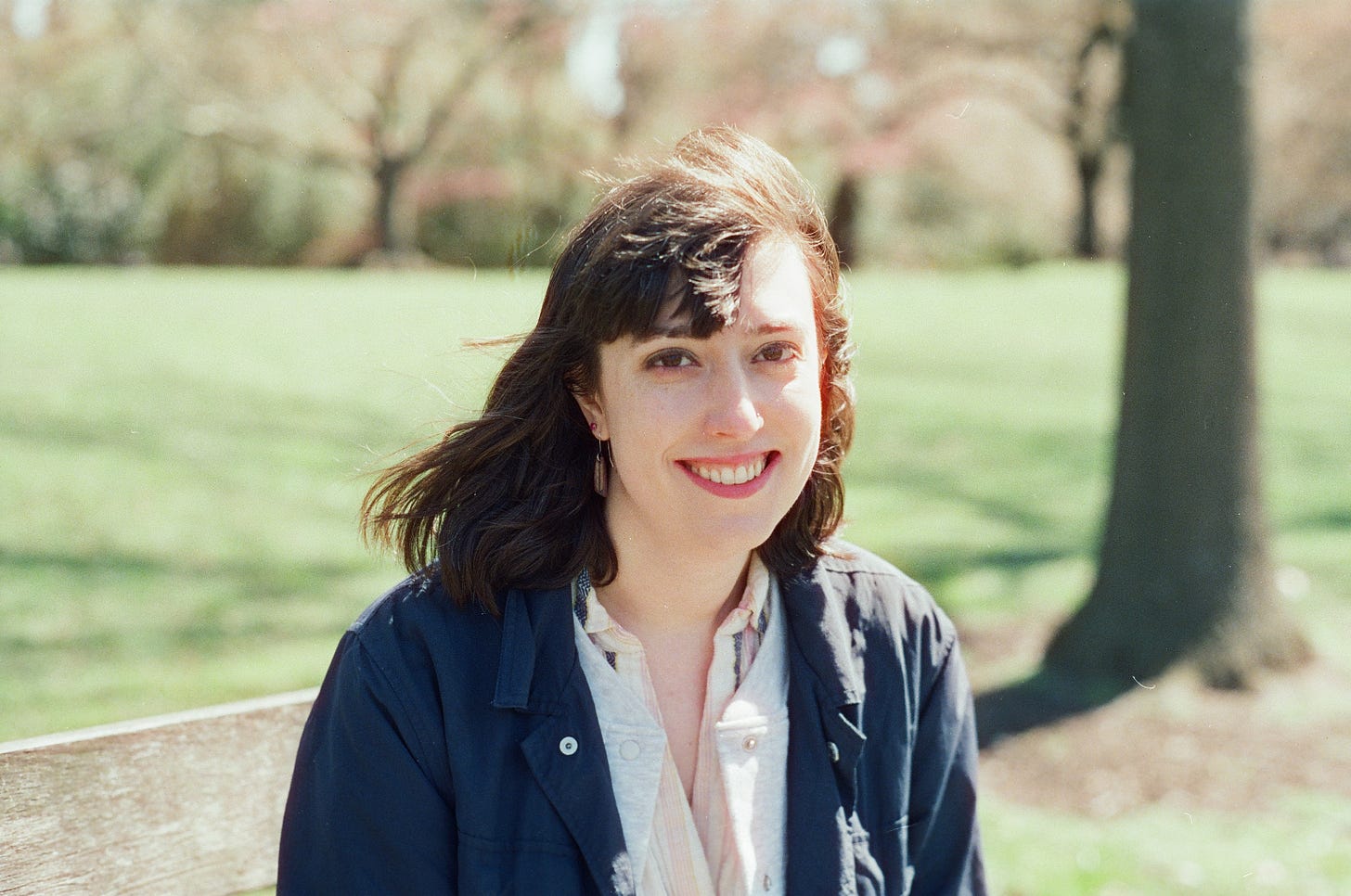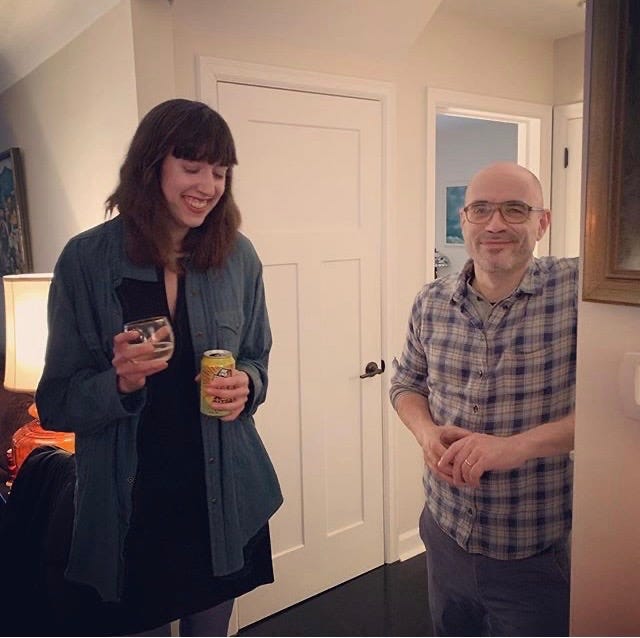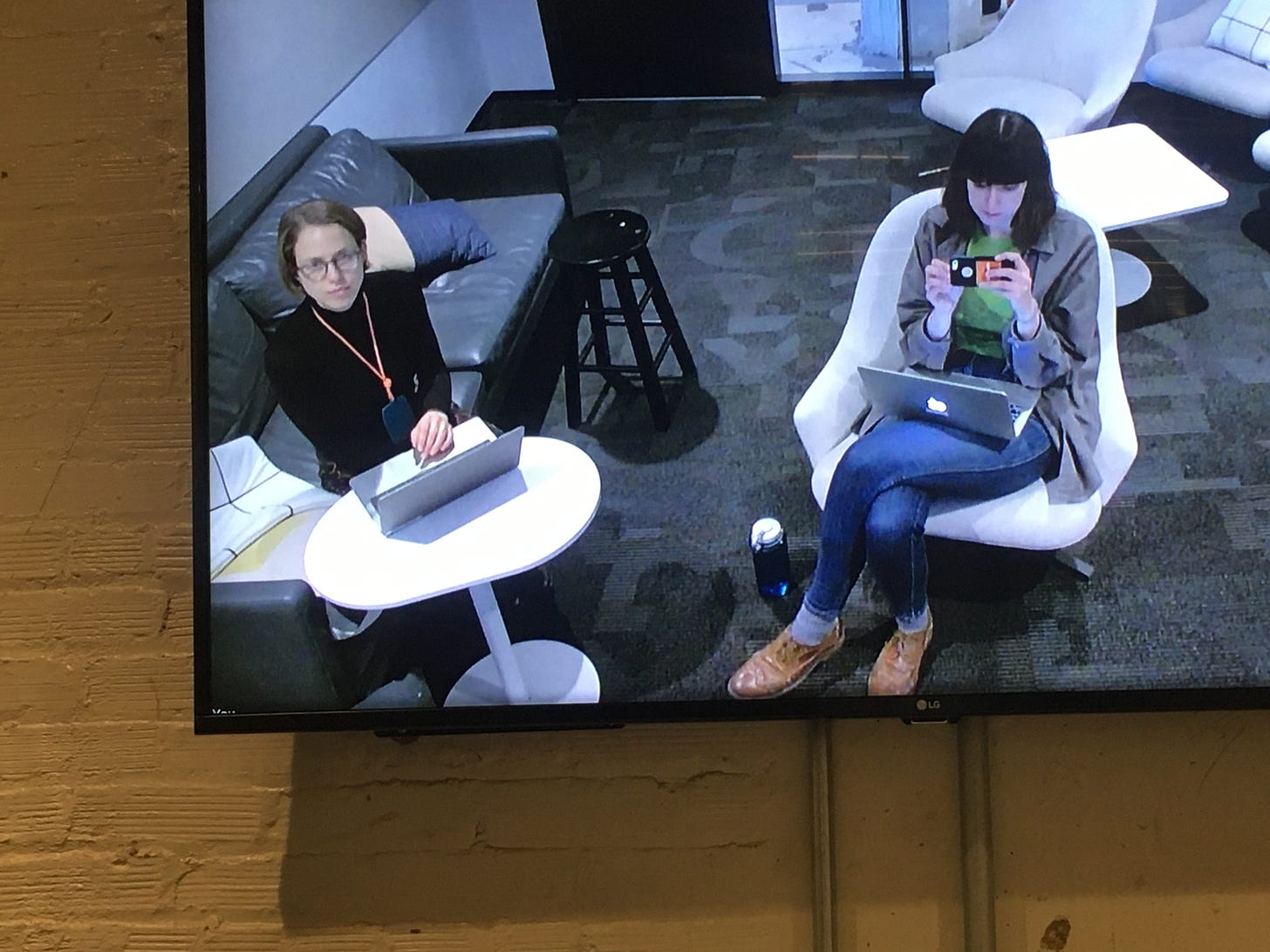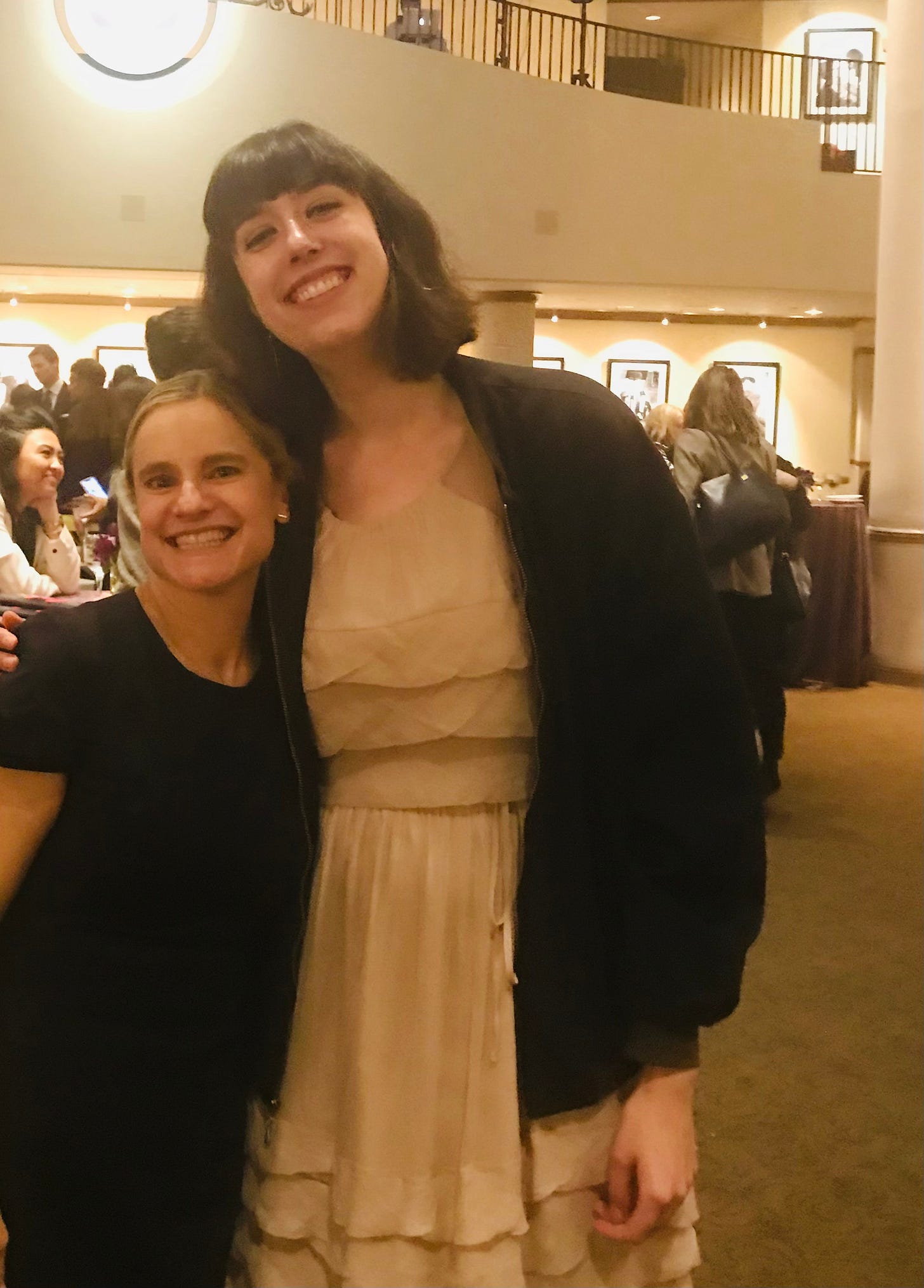Senior Producer Kalila Holt on Leaving Spotify and Heavyweight's New Chapter at Pushkin Industries
Plus, I Explain Why I Ghosted You.
👋 Hey, beautiful podcast people — remember me?
Fifteen months ago, I did the one thing you’re not supposed to do with a newsletter: I ghosted. No farewell post, no “see you soon,” just… silence. Life got busy — my son was applying to college, I was exploring a career shift — and The Squeeze slipped to the bottom of both our inboxes.
For a while I told myself I’d get back on track. Then the guilt about not writing turned to shame, which turned into… not writing. After months of low-key shame-spiraling, crashing out, then looping back for more (0/10, do not recommend), I finally landed back in reality and realized the answer was clear: it’s time to say goodbye. I’ll leave the archives up, so if revisiting stories about fake podcast internships or flailing public radio stations is your idea of a good time, I’ve got you. And who knows? Podcasts have taught us that nothing really ends; there’s always a bonus episode, a final live show, a surprise drop. So let’s just say that this is goodbye — for now.
It feels right that my final piece is about Heavyweight, the podcast that inspired me to start writing about this industry in the first place. In 2018, the team behind the show began reporting on an unresolved high school trauma of mine (my son Clark, who played a central role within the story’s narrative, left for college this year; what is time?). In the midst of that experience, I started looking for opportunities to get more involved in the world of podcasting myself. As a result, by the time Heavyweight released “Skye” in 2019, I was already writing about the industry at Inside Podcasting.
Of course, 2019 was also the year that Spotify acquired Gimlet for $230 million in cash. Four years later, after realizing he had gravely mistaken the word “podcast” for “easy money,” Daniel Ek told shareholders that he had been “carried away” when he bought the podcast company. The slow, painful process of laying off nearly all former Gimlet employees and shuttering its podcasts took about a year (Science Vs. still remains). By the end of 2023, Gimlet, the buzzy startup that had cleverly chronicled its birth in a podcast, had finally suffered through an even more high-profile death.
However, when it came to ending Heavyweight, Spotify decided to do something unusual: it provided an opportunity for the show’s newly-unemployed staff to negotiate for its IP (why the streamer didn’t offer the same opportunity to the producers of lesser-known shows remains a mystery — but I digress). And so, as Senior Producer Kalila Holt recounts in today’s interview, Heavyweight Host and Executive Producer Jonathan Goldstein hired a lawyer, acquired the IP, and along Kalila and Managing Producer Stevie Lane, found a new place to make the show: Pushkin Industries.
Which brings us to today, and the launch of Heavyweight’s first regular season under the the Pushkin banner (its inaugural episode dropped this morning). A couple of months ago, when I heard the show’s newest installment was on its way, I celebrated the good news by reaching out to Kalila Holt to catch up on what went on behind-the-scenes as the team exited Spotify, searched for a new home, and began its latest chapter at Pushkin. Our conversation touched on the perspective she’s gained since those early and intoxicating days at Gimlet, the “very strange” experience of shopping a show in the midst of an industry meltdown, and what the vibe is like at her new job. I hope you enjoy it!
And if you’re craving more Heavyweight content after reading this piece, be sure to check out Nick Quah’s Vulture interview with Jonathan Goldstein this week, which goes into more detail regarding the season’s plot lines, and if you appreciate deep cuts, check out my vintage Q&A with the intrepid host, which appeared in Bello Collective (RIP) in 2019 — I believe it still holds up!
Finally, thanks to all of you for reading, sending tips, leaving comments, and for sharing your stories with me. Writing The Squeeze for you has been a wonderful and wild ride and I will miss it.
Take care of each other out there,
Skye
Senior Producer Kalila Holt on Leaving Spotify and Heavyweight's New Chapter at Pushkin Industries
This interview has been edited for length and clarity.
Skye: How did you learn Spotify was letting Heavyweight go?
Kalila: It wasn’t unexpected. We were the third round of layoffs in a year. It actually felt harder to see so many of my friends lose their jobs in earlier rounds — really talented people were so good at their jobs, and suddenly they’re hearing that they are no longer employable. It was painful — especially when I would think back to the early days at Gimlet, when everyone was so excited to make good work. But it also showed me what was happening in the industry — it gave me a bird’s-eye view of what was going on, so that by the time it came for us, I had had more time to process it. I knew the writing was on the wall.
Skye: From the outside, despite the industry shifts, it still felt shocking that Spotify was letting go of such an ostensibly successful podcast. What reason did they give you? I mean, the party line was that it was too expensive, economic headwinds, but…
Kalila: They said the same thing to us — they didn’t want to spend money on reported-out shows that were coming out seasonally. They wanted to invest in podcasts that were “always on,” that were cheaper to make, where lots of people listen.
Skye: How did you get the show rights?
Kalila: When Spotify laid us off, it was explicit that they wanted to negotiate with us on the IP, so Jonathan worked with a lawyer to acquire it.
Skye: That’s great. So what happened next?
Kalila: The three of us — me, Stevie, and Jonathan — knew we wanted to stay together if at all possible. We briefly considered making something new, but given what was happening in the industry, we pretty quickly agreed that it was an advantage to have a show with a built-in audience, a back catalog — an established brand. And it’s not like we had some other brilliant idea, just waiting for this moment.
Skye: Were you worried about money during that period?
Kalila: Not in the beginning. We had nine months of severance, which felt like a crazy amount of time — I remember wondering whether I’d be able to take advantage of all that time! I felt concerned, but in a more existential way — like, would the show find a home at all, or would we be forced to compromise on the quality of the show, or make something we didn’t believe in. And then of course, the process ended up taking much longer than that. I did eventually reach a point where I started to feel nervous about not having any income. [Spotify laid off the Heavyweight team in December 2023; they went back to work in February of this year. — Skye]
Skye: Did you consider producing the show independently?
Kalila: We did talk about going independent, but none of us are all that business minded, so...
Skye: What was it like to shop the show?
Kalila: Those meetings were… very strange? We had a lot of them at all kinds of places — news organizations, corporate-style companies, smaller networks. It felt like another moment when I was seeing the industry more clearly.
Skye: In what way?
Kalila: We would usually meet with people on the editorial side of the business, most of whom knew our show and were very enthusiastic. At the end of these meetings, they would say something like, “this is great, we just need to sell it to the business people.” And each time it just became clear that the business people very much did not see the same value in what we were doing as the editorial side did. We got a lot of low-ball offers, or offers that were not feasible.
Skye: What did an offer that wasn’t feasible look like?
Kalila: For example, it would say that we had to make three times as many episodes for a third of the amount of money that we were making before.
Skye: Good Lord — did the production folks ever seem embarrassed or apologetic about these offers? Like, we realize that the business people don’t get it and this is ridiculous, and we’re sorry?
Kalila: The feedback was less “we’re sorry that the business side doesn’t get it” and more “it’s just a really tough time right now; no one wants to spend money.” It was also clear that companies that had made recent acquisitions — for example, Slate, with Death, Sex & Money and The New Yorker, with In the Dark — were not going to do that with multiple shows.
Kalila: Another thing was that most of the offers were straight licensing deals; we would be working as contractors, not employees. We would have had to form our own LLC, find our own health insurance; I wasn’t wild about that. Other times, we had situations where we would get really close and then it wouldn’t pan out — there was a situation where we all thought we were about to start work, and it ended up falling through at the last minute. Even with Pushkin, things got delayed.
Skye: It sounds exhausting.
Kalila: It was very whiplashy.
Skye: Going back to Pushkin — how did they enter the frame?
Kalila: They approached us quite late in the process, actually. But right off the bat, the tone of their offer was much more positive than the others.
Skye: How so?
Kalila: They seemed more invested in keeping the quality of the show. For example, like the others, they wanted us to make more content than we had at Gimlet, but they were open to working with us on what that would actually look like. We got to have a conversation about it — the shorter episodes and updates that we’ve been releasing in our feed this past summer came from that.
Another big thing was that they were willing to bring us onboard as employees — it’s still a licensing deal because Jonathan owns the IP, but the company hired us as full-time Pushkin staff.
Skye: It must have been a relief to see that in the offer, but were there any concerns about the state of Pushkin’s business, given the financial problems it had in 2023?
Kalila: There were discussions about it — but Pushkin has reoriented its business since then; they seem to be much more focused on having a sustainable business, rather than wringing out the most profit possible. And there really does seem to be an emphasis on things like work/life balance and compensating employees fairly.
Skye: Will Spotify benefit from this deal?
Kalila: Spotify will get a percentage of what we make for the first few years. (Spotify did not respond to an email requesting the details of this arrangement. — Skye)
Skye: Did you celebrate when the deal closed?
Kalila: There was a Pushkin happy hour after we started working there, which was nice. But to be honest, the whole thing had been such a weird process and taken so much longer than anticipated that by the time we actually closed on a deal, I felt more stressed than victorious.
Skye: Why did you feel stressed?
Kalila: It was a combination of feeling fatigued, not knowing exactly what the environment at Pushkin would be like, and then being like, “oh shit, now we have to make a whole season on a compressed timeline.”
Skye: I can understand that! Overall though, are you happy with the deal?
Kalila: Yes — we feel supported, and the workload and pay feel fair.
Skye: So what’s it like to work at Pushkin?
Kalila: Culturally, it feels closer to the early days of Gimlet than working at Spotify, or even late-stage Gimlet. It’s not the same as that, but we have bosses who we like and trust, and who understand production. These are very nice things, which you can’t always find, especially in larger organizations.
Skye: Looking back, how do you feel about the Gimlet and Spotify years?
Kalila: My feelings are complicated. On the whole, I feel lucky to have entered the industry when I did — when it was possible to grow. And I feel fortunate that I found this great team to work with and make something that I feel proud of — the fact that I still get to do that is pretty incredible, especially at this moment. But I also feel sad over how much this industry has changed. I hated seeing so many friends — people who I know are good at their jobs — get laid off and not be able to find work. The energy of those early days at Gimlet has been replaced by something else.
Skye: What do you mean by that?
Kalila: By the time we left Spotify, Heavyweight was profitable. We were not a show that was going to make anyone rich — we weren’t Joe Rogan — but we were delivering financially. Now that our industry is dominated by big companies, there isn’t as much room for that kind of show. We’re in a moment where you’re not safe, even if your show is making money, unless it’s a LOT of money, like millions and millions of dollars.
Skye: Looking back, is there a part of you that wishes Gimlet hadn’t been acquired by Spotify?
Kalila: Well [laughs], I don’t think Gimlet would have survived without the Spotify acquisition. But even when it happened, I was nervous about it. I mean, there were great things about it — we all got to go Sweden, we were well-paid. But I was nervous about it, even back then.
Skye: Do you still feel a sense of joy making the show?
Kalila: I definitely enjoy making the show. Taking time off helped me appreciate the work more, and it’s nice that things feel stable for our team at Pushkin. I actually feel pretty positive about work right now — and that’s not my normal outlook! I can have a pretty pessimistic and complainy attitude, but I’m not bullshitting; I actually do feel that.
That’s a wrap, but before you go:
The Heavyweight team will host a live show in New York City on October 18 at 1:30pm at Caveat, which will include “live storytelling, a meet-and-greet, Q&A, and more.” Tickets are free, but space is limited. They are available via a lottery system.






I miss reading your insights into the podcast game. I'm still podcasting myself. I understand you need to take care of yourself. Thank you for your work and kindness. Good vibes to you.
I end with the words of another podcaster bringing his podcast journey to a close, Marc Maron.
"Do what you need to do for your mental health without hurting yourself or others."
#BoomerLives
Thanks for all the Squeeze, Skye! I was just thinking about it yesterday (I must have heard you typing) and reflecting on how useful and good your work was.
Nice to hear from Kalila. I wish that more shows would consider independence - some of us have been out here this whole time! - but understand that the US healthcare system makes that way more difficult than it is elsewhere